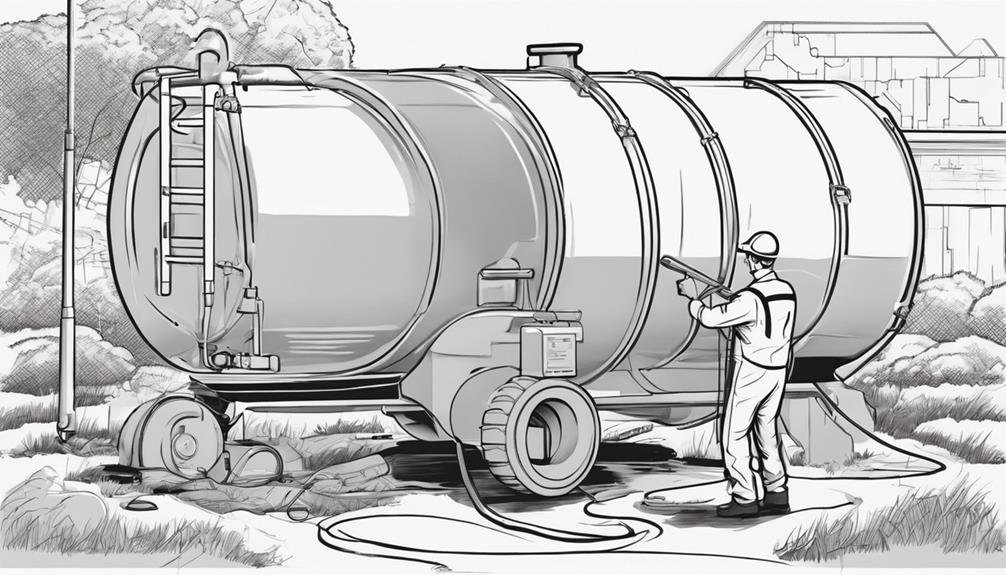When it comes to maintaining your septic system, think of it as tending to a delicate garden that requires precise care to flourish.
But how do you ensure your septic tank is operating at its best capacity? By understanding the optimal techniques for septic tank pumping, you can prevent costly mishaps and ensure the longevity of your system.
From proper inspection methods to strategic pumping frequency planning, each step plays a crucial role in the overall health of your septic tank.
Key Takeaways
- Regular inspections for leaks and damage are crucial.
- Choose a pump that suits tank size and waste volume.
- Plan pumping frequency strategically to prevent issues.
- Implement proper waste disposal practices for system health.
Proper Septic Tank Inspection Methods

When inspecting your septic tank, it's crucial to focus on checking for signs of leaks, cracks, or excessive corrosion. Regular tank maintenance is essential to ensure proper functioning and avoid costly repairs. Start by visually examining the tank's exterior for any visible signs of damage. Pay close attention to the seams and connections for leaks and cracks that could lead to seepage or contamination of the surrounding soil.
Additionally, inspect the drain field to ensure proper drainage and absorption of effluent. Over time, the drain field may become clogged or saturated, affecting the overall performance of your septic system. Keep the area around the drain field clear of heavy objects, vehicles, or structures to prevent damage to the pipes and distribution box.
Efficient Pumping Equipment Selection
Selecting the appropriate pumping equipment is crucial for maintaining the efficiency of your septic system. When choosing equipment for septic tank pumping, consider factors like the size of your tank, the distance from the access point to the tank, and the volume of waste that needs to be removed. It's essential to select a pump that can handle the capacity required for your specific system to ensure optimal pumping efficiency.
Efficient pumping equipment selection involves picking the right pump size and type. Submersible pumps are commonly used for septic tank pumping due to their ability to handle solids and efficiently move wastewater. Additionally, choosing a pump with the correct horsepower rating is vital to ensure it can effectively pump the contents of your tank.
Moreover, consider factors like the pump's durability, maintenance requirements, and energy efficiency when making your selection. Opting for a reliable and energy-efficient pump can help reduce long-term costs and ensure smooth operation. By carefully evaluating these aspects during equipment selection, you can enhance the overall efficiency of your septic system.
Strategic Pumping Frequency Planning

To optimize the performance of your septic system, strategic pumping frequency planning is essential to ensure efficient waste removal and prevent system overload.
Pumping schedule optimization and maintenance planning are crucial aspects to consider. The frequency at which you pump your septic tank directly impacts its functionality and longevity. A well-thought-out pumping schedule will prevent solids from building up excessively, reducing the risk of clogs and system failure.
Moreover, regular maintenance planning helps in identifying potential issues early on, saving you from costly repairs. When determining the pumping frequency, factors such as the tank size, household size, water usage, and waste management practices should be taken into account.
It's important to strike a balance between pumping too frequently, which can be wasteful, and not pumping enough, which can lead to system malfunctions and environmental impact considerations. By adhering to a strategic pumping frequency plan, you can effectively manage waste while maintaining a healthy septic system.
Effective Waste Disposal Strategies
For optimal septic system functionality and waste management, implementing effective waste disposal strategies is paramount in maintaining system efficiency and preventing potential issues. Waste management plays a crucial role in the longevity of your septic system. Proper waste disposal not only prevents clogs and backups but also ensures the health of your system and the environment.
To manage waste effectively, consider implementing drainage solutions such as installing a drain field to allow effluent to percolate into the soil gradually. This helps in reducing the load on your septic tank and prevents oversaturation of the drain field. Additionally, regularly diverting heavy water usage, like from laundry or showers, can aid in preventing system overload.
Proper waste disposal also involves avoiding flushing non-biodegradable items or hazardous chemicals down the drain, as these can disrupt the natural waste breakdown process and damage your septic system over time. By practicing these waste disposal strategies, you can maintain a healthy septic system and ensure efficient waste management for years to come.
Frequently Asked Questions
Can Septic Tank Pumping Cause Damage to the Surrounding Soil or Landscape?
When septic tank pumping is done improperly, it can lead to soil compaction and damage to the landscaping. This can have severe environmental impacts, causing groundwater contamination. Ensure professionals handle the process to minimize these risks.
Is It Possible to Over-Pump a Septic Tank, Leading to Potential Issues?
You can avoid over-pumping your septic tank by adhering to recommended pumping schedules. Prevention measures include regular inspections, monitoring sludge levels, and consulting professionals for guidance. This helps prevent potential issues associated with over-pumping.
Are There Any Regulations or Permits Required for Septic Tank Pumping in Certain Areas?
In some areas, permits are required for septic tank pumping to ensure compliance with regulations. These regulations aim to protect the environment and ensure proper pumping techniques are followed to prevent issues.
How Can Homeowners Tell if Their Septic Tank Needs Pumping Before Any Issues Arise?
To maintain your septic system effectively, assess your tank regularly. Utilize septic tank inspection to detect issues early. Follow preventative maintenance guidelines to extend your system's lifespan. Pumping frequency depends on household size and tank capacity.
What Are Some Common Signs of a Malfunctioning Septic System That May Require More Than Just Pumping?
When your septic system acts up, you might notice odors, slow drains, or soggy areas. These issues demand attention beyond just pumping. Regular maintenance, like inspecting your tank and drain field, can help avoid bigger problems.
Conclusion
In conclusion, by following proper septic tank inspection methods, selecting efficient pumping equipment, planning strategic pumping frequencies, and implementing effective waste disposal strategies, you can ensure the optimal functioning of your septic system.
Just like a well-oiled machine, a well-maintained septic tank will continue to operate smoothly and efficiently, reducing the risk of costly repairs and environmental hazards.
Stay on top of maintenance tasks to keep your septic system running like a well-oiled machine.

